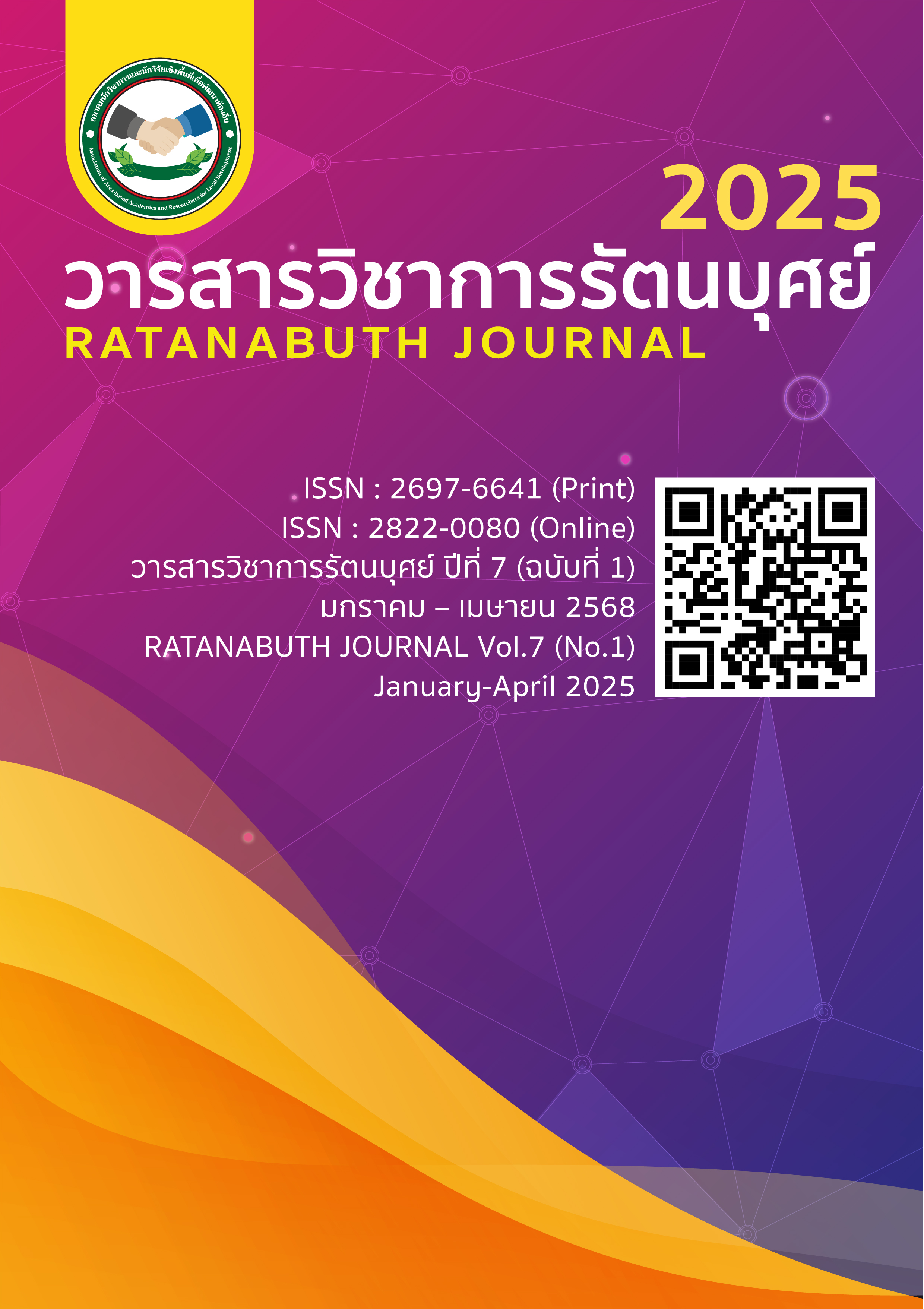The Integration of Buddhist Principle Based on Sufficiency Economy Philosolphy in the Lives of People in Bua Daeng Subdistrict Administrative Organization, Pathumrat District, Roi Et Province The Integration of Buddhist Principle Based on Sufficiency Economy Philosolphy in the Lives of People in Bua Daeng Subdistrict Administrative Organization, Pathumrat District, Roi Et Province
Main Article Content
Abstract
The modernization of Thailand has impacted various aspects of Thai society, including economics, politics, culture, society, and the environment. While positive outcomes such as economic growth have been observed, negative consequences such as economic and social inequality have also emerged. These issues have affected the quality of life for people in the administrative area of Bua Daeng Subdistrict, Pathumrat District, Roi Et Province, leading to deeply rooted poverty driven by a free-market economy and structural limitations. This research aimed to: 1) examine the integration of Buddhist principles based on the philosophy of sufficiency economy into the daily lives of local residents; 2) compare the integration of these principles across personal factors; and 3) provide recommendations for applying these principles. Quantitative methods were employed with a sample of 354 participants. Data were collected using a questionnaire with content validity ranging from 0.67 to 1.00 and a reliability coefficient of 0.90. Statistical analysis was performed using frequency, percentage, mean, standard deviation, t-tests, and F-tests.
The results revealed that: 1) The overall integration of Buddhist principles based on the sufficiency economy philosophy in daily life was at a high level (= 4.26, S.D. = 0.70). 2) Comparison by personal factors such as gender, education, occupation, and income showed no overall differences; however, age revealed statistically significant differences in overall integration and ethical conditions at the .05 level. And 3) Recommendations include maintaining moderation, avoiding excessive actions that harm oneself or others, making reasonable decisions regarding sufficiency levels, and fostering alignment with sufficiency economy principles. Applying these recommendations supports personal potential, aligns life practices with sufficiency economy philosophy, and promotes long-term sustainable and balanced quality of life.
Article Details

This work is licensed under a Creative Commons Attribution-NonCommercial-NoDerivatives 4.0 International License.
References
ธนวัฒน์ ชาวโพธิ์. (2565). ภาวะผู้นำตามหลักสัปปุริสธรรม 7 ของนักศึกษามหาวิทยาลัยมหามกุฏราชวิทยาลัย วิทยาเขตศรีล้านช้าง. วารสารวิจัยศรีล้านช้าง, 2(4), 57–65.
ธานินทร์ ศิลป์จารุ. (2563). การวิจัยและวิเคราะห์ข้อมูลทางสถิติด้วย SPSS และ AMOS. กรุงเทพฯ: ซีเอ็ดยูเคชั่น.
ปาริชาติ คุณปลื้ม. (2564). การนำหลักปรัชญาเศรษฐกิจพอเพียงไปประยุกต์ใช้ในยุคที่มีการแพร่ระบาดของโคโรนาไวรัส. วารสารด้านการบริหารรัฐกิจและการเมือง, 10(2), 1–10.
องค์การบริหารส่วนตำบลบัวแดง. (2565). แผนพัฒนาท้องถิ่น พ.ศ. 2565–2570 (เพิ่มเติมครั้งที่ 5).ร้อยเอ็ด
พระธรรมปิฎก (ประยุทธ์ ปยุตฺโต). (2546). พจนานุกรมพุทธศาสน์ ฉบับประมวลธรรม. กรุงเทพฯ: มหาจุฬาลงกรณราชวิทยาลัย.
พระมหาประยุทธ์ ปยุตฺโต (ยาวิชัย), พระครูศรีสุธรรมนิวิฐ, และวรกฤต เถื่อนช้าง. (2564). การบูรณาการหลักสัปปุริสธรรมในการบริหารจัดการการศึกษาของสถานศึกษา มหาวิทยาลัยมหาจุฬาลงกรณราชวิทยาลัย วิทยาเขตนครสวรรค์. วารสารการศึกษาศาสนาและศิลปวัฒนธรรม, 6(11), 1–15.
เริงวิชญ์ นิลโคตร และคณะ. (2564). การบูรณาการหลักปรัชญาของเศรษฐกิจพอเพียงเพื่อพัฒนาเครือข่ายเกษตรอย่างยั่งยืนในพื้นที่จังหวัดนครปฐม. วารสารสังคมศาสตร์และวัฒนธรรม, 5(2), 45–60.
ละเอียด ศิลาน้อย. (2562). วิธีวิทยาการกำหนดขนาดของกลุ่มตัวอย่างเพื่อการวิจัยเชิงปริมาณ เชิงสำรวจ และเชิงทดลอง. กรุงเทพฯ: บางกอกบลูพริ้นต์.
วัชรินทร์ ศรีวิรานนท์. (2564). การประยุกต์ใช้ปรัชญาของเศรษฐกิจพอเพียงในการบริหารจัดการการดำเนินธุรกิจก่อสร้างของห้างหุ้นส่วนจำกัด ทีเอ็นคอนสตรัคชัน เชียงใหม่.วิทยานิพนธ์ปริญญาวิทยาศาสตรมหาบัณฑิต. เชียงใหมา: มหาวิทยาลัยแม่โจ้.
สำนักงานคณะกรรมการพิเศษเพื่อประสานโครงการอันเนื่องมาจากพระราชดำริ. (2541). แนวคิดและทฤษฎีการพัฒนาอันเนื่องมาจากพระราชดำริ. กรุงเทพฯ: บริษัท 21 เซ็นจูรี่ จำกัด.
สมเด็จพระญาณสังวร (เจริญ สุวฑฺฒโน). (2543). ทศบารมี ทศพิธราชธรรม (พิมพ์ครั้งที่ 3). กรุงเทพมหานคร: โรงพิมพ์มหามกุฏราชวิทยาลัย.
อมร รักษาสัตย์ (บรรณาธิการ). (2515). การเมืองการปกครองไทยตามรัฐธรรมนูญฉบับประชาชน. กรุงเทพฯ: ศูนย์หนังสือจุฬาลงกรณ์มหาวิทยาลัย.
อภิชัย พันธเสน. (2544). พุทธเศรษฐศาสตร์. กรุงเทพฯ: สำนักพิมพ์อัมรินทร์.
Krejcie, R. V., & Morgan, D. W. (1970). Determining sample size for research activities. Educational and Psychological Measurement, 30(3), 607–610.


